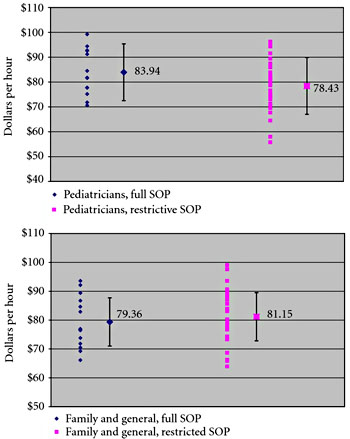Here’s an interesting tidbit of research. Many states place substantial restrictions on the work that nurse practitioners are allowed to perform. Allowing them to do more might help relieve the shortage of family doctors and primary care pediatricians, but most doctor groups oppose this. Part of the reason is the fear that it would reduce  physician pay, so Patricia Pittman and Benjamin Williams set out to see if this was true. Their answer: not really. In states that ditched their restrictive SOP (scope of practice) laws — the blue dots in the charts on the right — pediatricians actually made more money, while GPs made slightly less. In both cases, the difference was small and not statistically significant. Aaron Carroll comments:
physician pay, so Patricia Pittman and Benjamin Williams set out to see if this was true. Their answer: not really. In states that ditched their restrictive SOP (scope of practice) laws — the blue dots in the charts on the right — pediatricians actually made more money, while GPs made slightly less. In both cases, the difference was small and not statistically significant. Aaron Carroll comments:
Bottom line — there was no difference. Allowing more mid-level practitioners to practice freely and independently was not associated with physicians earning less.
In the interest of full disclosure, I’m married to a nurse practitioner. So I may be biased in my assessment that she’s amazingly talented. But for those physicians who are worried that increasing the ability of mid-level practitioners to work independently might negatively impact their income, that doesn’t necessarily seem to be the case.
Incumbent professionals often promote restrictive occupational licensing schemes because they want to limit competition. In many cases, this is probably rational in a self-serving way. But in others, it probably doesn’t even make sense from a purely selfish perspective. This seems to be one of them.














